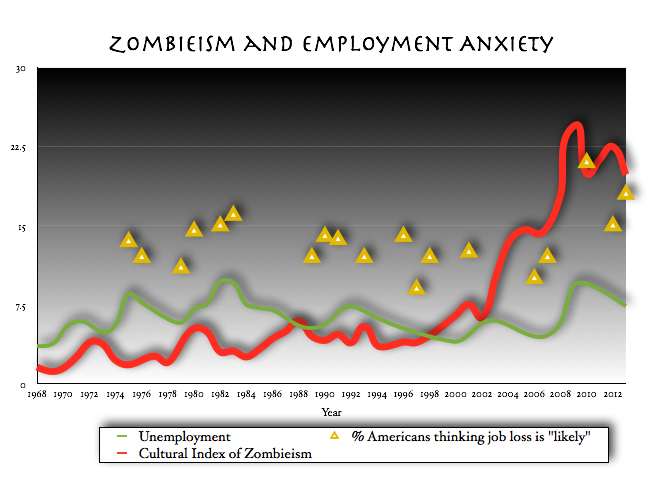Since the canonical 1968 zombie film, George Romero’s “Night of the Living Dead,” pop cultural zombieism outbreaks have come and gone in waves. Why do the undead ebb and flow so? The prevalence of zombieism has been linked to periods of political change, hysteria over HIV and other contagions, knowledge worker economic insecurity, and virtually all social disruptions.
Without directly disputing the validity of those theories, I have another hypothesis to add to the mix.
Zombieism is an expression of a very specific fear: becoming unemployed.
Zombieism is a collective emotional projection by employed persons terrified of their losing their work, income, and identity. For those who fear loss of livelihoods, the ranks of the laid-off, dismissed, underemployed, and never-hired are all too similar to a growing outbreak of zombies.
Fear
By one study at least, it appears that 47% of U.S. employment could be replaced by automation in the next ten years. Coupled with Great Recessionary catastophes, that brutal fact can instill abject terror. Seemingly secure workers could at any moment join the shuffling hordes of the unemployed. Their incomes are at risk, yes. But, perhaps more importantly, their idenitities are threatened: their social positions, their family’s esteem, and their investment (both psychological and financial) in the current social order. The illusions and pretensions of the upper middle class would seem especially vulnerable to this gnawing, flesh-rending fear.
Pity & Revulsion
Zombies were once human. Most disturbingly, they can be people we knew in life. Like a recognizable corpse, the unemployed can be both repulsive and heartbreaking. The unlucky creature may be family member, a former colleague, or a desperate acquaintance pinging plaintively for introductions on LinkedIn. They are consigned to the life without life of the long-term unemployed… to join the desperate clawing of middle aged professionals begging for an interview, as their friendships, business contacts, professional networks, their homes, clothing, and even their bodies decay and fall apart.
Zombieism spreads by proximity and feeding. Is unemployment contagious? Will the jobless devour? Will they sink their teeth in to extract emotional or financial nourishment when the employed are clinging to their own diminishing networks and resources? Stay away from the losers. Don’t be infected by their poor decisions, bad luck, unworthiness for life.
THE DATA
How do we prove this interchangeability of fears? What would establish a link between fear of unemployment and the cultural prevalence of zombieism?
Why data, of course.
Not since the Washington Post’s “President Obama and the horse mask person” investigation has there been a data-driven news story of this importance.
Through impeccable proprietary scientific processes, I have developed a Cultural Index of Zombieism™ (or CIZ™) derived from mentions of “zombies” in the New York Times, the word appearing in books in English scanned by Google, and the number of zombie films released each year.
The graph below charts the CIZ from 1968 through 2013 along with the percentage of Americans who told Gallup pollsters that they feared it was “likely” they would soon lose their jobs. For reference, the federal government’s annual unemployment rate is charted on the same graph. Behold the resulting infographic:
It sure looks like something’s going on here. To find out, we sought a professional statistical analysis of the raw data by a Johns Hopkins University faculty member. The results were decisive:
THERE IS A CORRELATION!
When the percentage of people fearing job loss increases, there is a statistically significant increase in the CIZ. Based on the 1968–2013 statistics, the CIZ is predicted to increase by 1.2 for every one percent increase in Americans’ fear of job loss.
Because there is a correlation, there must be causation, right?
Fear of job loss drives our pop culture fixation on zombies.
Q.E.D.
#
Sources:
- The Cultural Index of Zombieism™©®√ is derived through a patent-pending algorithm and these data sources:
- The New York Times Chronicle
- The Wikipedia entry, “List of zombie films”
-
Surveys of Americans’ fears of unemployment can be found in Gallup Historical Trends | Work and Workplace
-
Historical data on the unemployment rate can be found via U.S. Bureau of Labor Statistics Data.




![Reblog this post [with Zemanta]](http://img.zemanta.com/reblog_e.png?x-id=25000d41-edee-4918-b2b1-c22100ef7fb6)

